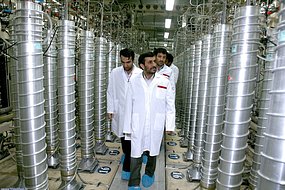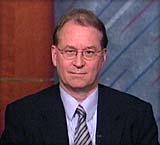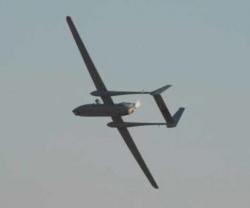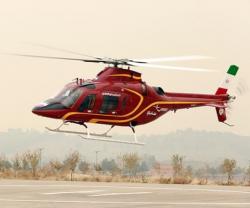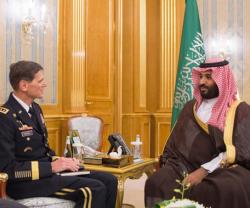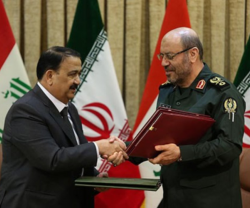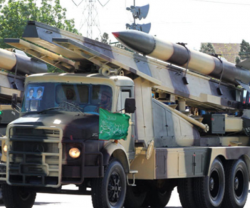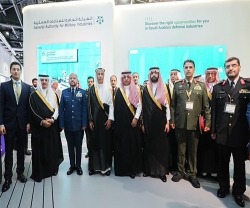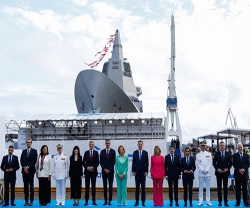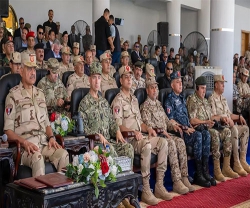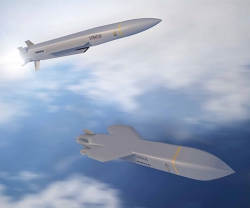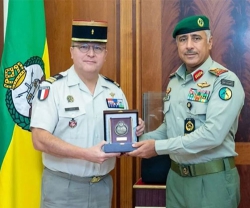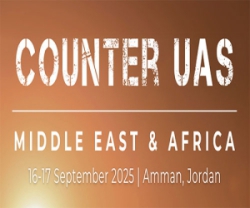Nuclear Iran looms as hardliners prevail
06.08.2009 Iran
With Iran's hardline leadership prevailing over post-election unrest, its atomic programme looks on course to reach bomb-making potential under the noses of UN inspectors and beyond the reach of US overtures for talks, analysts say.
The International Atomic Energy Agency has made no headway in getting Iran to permit broader surveillance of its rapidly expanding uranium enrichment plant so as to ensure no materials are diverted for weapons purposes, diplomats said.
Iran has accumulated enough low-enriched uranium (LEU) for further refinement into the high-enriched form needed to fuel a bomb, analysts say. And the output rate has leapt as the number of centrifuge machines has risen eight-fold over the past year.
'The continuing increases in LEU production at Natanz represent progress along a path which could end in an Iranian ability to produce a nuclear weapon,' said a senior West European diplomat accredited to the IAEA.
Iran says it wants only peaceful nuclear power so it can export more oil. But it is stockpiling LEU without nuclear power plants to use it and has curbed the scope of inspections.
Western hopes for a more 'moderate' Iran ready to negotiate a cap on its nuclear work and accept stricter IAEA monitoring fizzled when the Islamic establishment quelled a popular eruption over alleged fraud in the June presidential election, leading to Mahmoud Ahmadinejad's re-inauguration on Wednesday.
'Iran is not engaging IAEA requests for (transparency). Iran just sees this as part of negotiations (with big powers). Until there are some, they won't do anything,' said David Albright, head of a US think-tank that tracks nuclear proliferators.
The IAEA said in June that the Natanz plant was swiftly outgrowing inspectors' ability to monitor it effectively -- namely, to verify no deviations from civilian enrichment.
Some 5,000 centrifuge machines were enriching uranium at that time with, 2,400 more being set up on the same underground production floor. The next batch may well be refining nuclear fuel full time by the next IAEA report in late August, with a similar number on line for installation.
'This plant is both under construction and operating at the same time -- that's a very uncommon situation for monitors,' said a UN official who asked for anonymity.
'That's why the IAEA has to adjust to keep a full picture of the uranium feed and tail points, adjusting and adding cameras.'
To 'weaponise' enrichment, Iran would have to recalibrate its centrifuges to produce high-enriched uranium, convert the HEU into a metal and miniaturize it to pack into a warhead.
It is highly unlikely Iran would go down that road at Natanz as the IAEA would almost certainly notice and sound the alarm.
But UN inspectors have no right to roam beyond Iran's declared civilian nuclear sites. That leaves them unable to verify Iran has no parallel military nuclear enterprise somewhere in the vast, security-gripped country.
There is no hard evidence of one. But Iran has stonewalled an IAEA inquiry into Western intelligence suggesting it combined uranium processing with high-altitude explosives tests and work to modify a missile cone for a nuclear warhead.
Western estimates as to when Iran could 'go nuclear' stretch from six months to five years, the uncertainty owing to Iran's political opacity and resistance to intelligence penetration.
IAEA Director-General Mohamed ElBaradei added to concerns in June when, dropping usual diplomatic caveats, he said he was now sure Iran's goal was to show it could build atom bombs in short order to deter adversaries, like the United States and Israel.
US President Barack Obama has given Iran until September to engage a revised, six-power offer of talks on trade benefits if it shelves enrichment, or face harsher sanctions.
Tehran has withheld a concrete answer for months in what, diplomats say, amounts to buying time for enrichment expansion. Now, with post-election protests preoccupying the Islamic establishment, Iran looks less inclined than ever to negotiate.
'The political turmoil has likely rendered Iran incapable of making decisions of this magnitude. The timing (for talks) has to be reconsidered,' said Trita Parsi, moderate head of the National Iranian-American Council.
The stubborn absence of a diplomatic horizon has given way to informal US-European discussions about expanding sanctions to target Iran's vulnerable oil refining sector to try to force the Islamic Republic to the negotiating table.
But an embargo on gasoline exports to Iran would be hard to enforce because of opposition by major trade partners Russia and China, dissent in a European Union fearing retaliatory cutoffs of Iranian oil, and Iran's porous, smuggler-friendly borders.
Obama has parried Israeli pressure for military strikes on Iran. Most Western officials feel that would ignite the Middle East, worsen terrorism globally, cause oil prices to skyrocket and only delay, not stop, an Iranian nuclear 'breakout'.
Last month, Washington fanned Israeli fears that it may become resigned to living with a nuclear Iran when Secretary of State Hillary Clinton said the United States could set up a defence umbrella over Middle East allies so Iran 'won't be able to intimidate or dominate ... once they have a nuclear weapon'.
Officials close to Obama hastened to deny a 'containment' scenario, recalling the US-Soviet Cold War standoff, was under consideration, saying Clinton was speaking for herself.
'There is still a strong belief that a nuclear-armed Iran is by no means the only possible destination,' said the senior West European diplomat. 'There's still a conviction that Iran can be persuaded of the unwisdom and unsustainable cost of striving to reach that destination. Our objective remains dissuasion.
The International Atomic Energy Agency has made no headway in getting Iran to permit broader surveillance of its rapidly expanding uranium enrichment plant so as to ensure no materials are diverted for weapons purposes, diplomats said.
Iran has accumulated enough low-enriched uranium (LEU) for further refinement into the high-enriched form needed to fuel a bomb, analysts say. And the output rate has leapt as the number of centrifuge machines has risen eight-fold over the past year.
'The continuing increases in LEU production at Natanz represent progress along a path which could end in an Iranian ability to produce a nuclear weapon,' said a senior West European diplomat accredited to the IAEA.
Iran says it wants only peaceful nuclear power so it can export more oil. But it is stockpiling LEU without nuclear power plants to use it and has curbed the scope of inspections.
Western hopes for a more 'moderate' Iran ready to negotiate a cap on its nuclear work and accept stricter IAEA monitoring fizzled when the Islamic establishment quelled a popular eruption over alleged fraud in the June presidential election, leading to Mahmoud Ahmadinejad's re-inauguration on Wednesday.
'Iran is not engaging IAEA requests for (transparency). Iran just sees this as part of negotiations (with big powers). Until there are some, they won't do anything,' said David Albright, head of a US think-tank that tracks nuclear proliferators.
The IAEA said in June that the Natanz plant was swiftly outgrowing inspectors' ability to monitor it effectively -- namely, to verify no deviations from civilian enrichment.
Some 5,000 centrifuge machines were enriching uranium at that time with, 2,400 more being set up on the same underground production floor. The next batch may well be refining nuclear fuel full time by the next IAEA report in late August, with a similar number on line for installation.
'This plant is both under construction and operating at the same time -- that's a very uncommon situation for monitors,' said a UN official who asked for anonymity.
'That's why the IAEA has to adjust to keep a full picture of the uranium feed and tail points, adjusting and adding cameras.'
To 'weaponise' enrichment, Iran would have to recalibrate its centrifuges to produce high-enriched uranium, convert the HEU into a metal and miniaturize it to pack into a warhead.
It is highly unlikely Iran would go down that road at Natanz as the IAEA would almost certainly notice and sound the alarm.
But UN inspectors have no right to roam beyond Iran's declared civilian nuclear sites. That leaves them unable to verify Iran has no parallel military nuclear enterprise somewhere in the vast, security-gripped country.
There is no hard evidence of one. But Iran has stonewalled an IAEA inquiry into Western intelligence suggesting it combined uranium processing with high-altitude explosives tests and work to modify a missile cone for a nuclear warhead.
Western estimates as to when Iran could 'go nuclear' stretch from six months to five years, the uncertainty owing to Iran's political opacity and resistance to intelligence penetration.
IAEA Director-General Mohamed ElBaradei added to concerns in June when, dropping usual diplomatic caveats, he said he was now sure Iran's goal was to show it could build atom bombs in short order to deter adversaries, like the United States and Israel.
US President Barack Obama has given Iran until September to engage a revised, six-power offer of talks on trade benefits if it shelves enrichment, or face harsher sanctions.
Tehran has withheld a concrete answer for months in what, diplomats say, amounts to buying time for enrichment expansion. Now, with post-election protests preoccupying the Islamic establishment, Iran looks less inclined than ever to negotiate.
'The political turmoil has likely rendered Iran incapable of making decisions of this magnitude. The timing (for talks) has to be reconsidered,' said Trita Parsi, moderate head of the National Iranian-American Council.
The stubborn absence of a diplomatic horizon has given way to informal US-European discussions about expanding sanctions to target Iran's vulnerable oil refining sector to try to force the Islamic Republic to the negotiating table.
But an embargo on gasoline exports to Iran would be hard to enforce because of opposition by major trade partners Russia and China, dissent in a European Union fearing retaliatory cutoffs of Iranian oil, and Iran's porous, smuggler-friendly borders.
Obama has parried Israeli pressure for military strikes on Iran. Most Western officials feel that would ignite the Middle East, worsen terrorism globally, cause oil prices to skyrocket and only delay, not stop, an Iranian nuclear 'breakout'.
Last month, Washington fanned Israeli fears that it may become resigned to living with a nuclear Iran when Secretary of State Hillary Clinton said the United States could set up a defence umbrella over Middle East allies so Iran 'won't be able to intimidate or dominate ... once they have a nuclear weapon'.
Officials close to Obama hastened to deny a 'containment' scenario, recalling the US-Soviet Cold War standoff, was under consideration, saying Clinton was speaking for herself.
'There is still a strong belief that a nuclear-armed Iran is by no means the only possible destination,' said the senior West European diplomat. 'There's still a conviction that Iran can be persuaded of the unwisdom and unsustainable cost of striving to reach that destination. Our objective remains dissuasion.
Previous PostIran vows to hit Israel's atomic sites if attacked
Latest news
Latest events
Counter UAS Middle East & Africa 2025
16 - 17 Sep 2025Amman - JordanIntersec Saudi Arabia
29 Sep - 01 Oct 2025Riyadh International Exhibition & Convention Centre - Saudi ArabiaDubai International Air Chiefs’ Conference (DIACC 2025)
16 Nov 2025Atlantis, The Palm Dubai - United Arab EmiratesDubai Airshow
17 - 21 Nov 2025Dubai World Central (DWC) - United Arab Emirates

